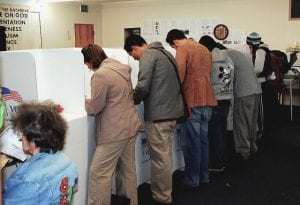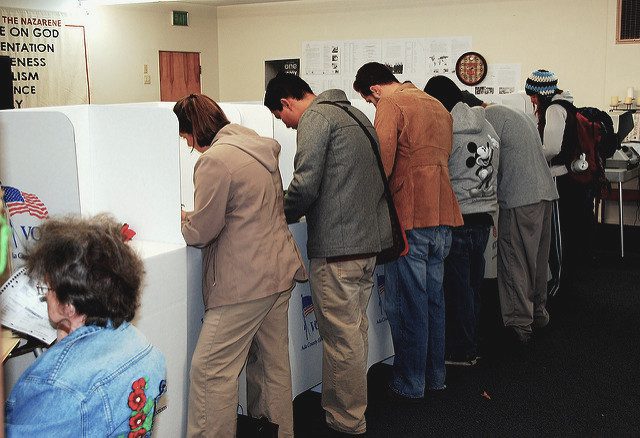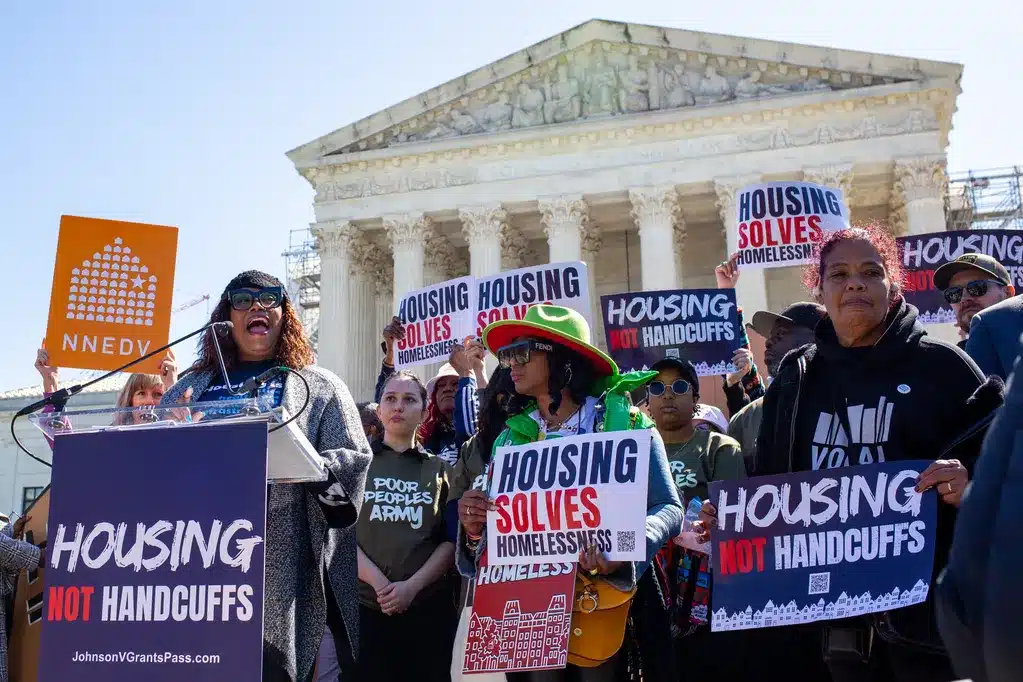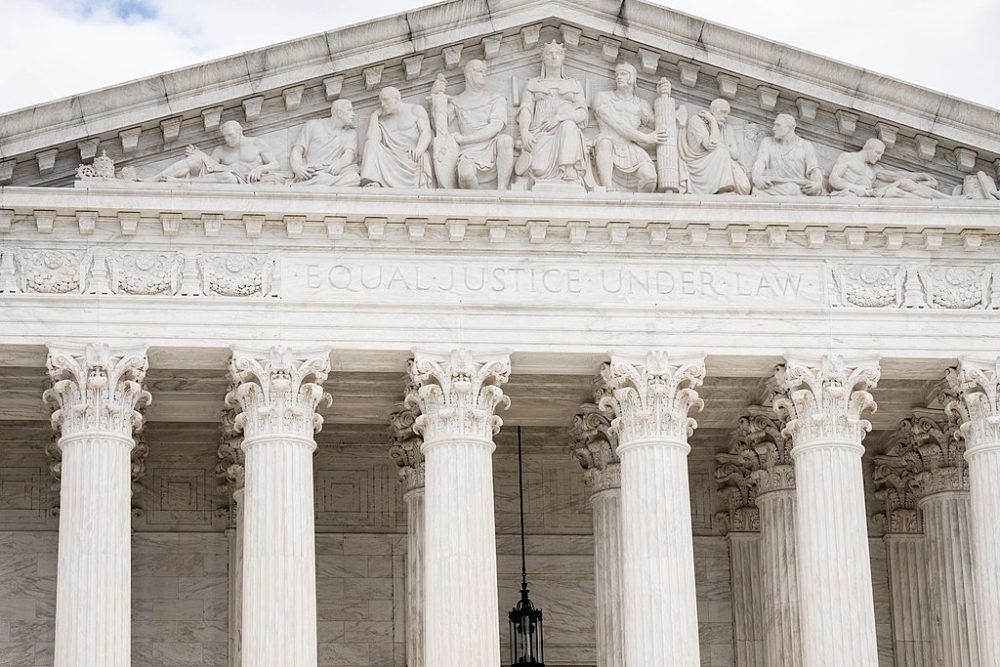
Precinct 86 voting booths. Photo by Whitney via flickr, CC BY-NC-ND 2.0
Over the last three months, Sens. Elizabeth Warren, Cory Booker, and Kamala Harris have all introduced major housing bills. All three may be presidential hopefuls. As reported in a recent article in The Hill, their bills signal that housing—long ignored in national politics—will be an election issue in 2020.
As housing organizers and community leaders who see and experience housing injustice on a daily basis, we believe this is a good thing, and about 40 years overdue.
We also believe it is worth understanding why housing has been so neglected, why it is rising to prominence now, and what it will take to ensure that housing stays on the agenda in a way that reflects the real needs of the people most impacted by housing injustice.
Why Housing Has Been Neglected (And Why It’s A Popular Issue Now)
Before we celebrate its acknowledgement as a national political issue, and certainly before we set out to solve for housing injustice, we should understand why America has overlooked housing.
Based on our experience at the front lines of our nation’s housing crisis, it comes down to these things:
- America hasn’t owned up to our racist history.
2. Housing is ignored because it’s seen as a poor people’s issue.
3. Wall Street has a chokehold on our politics and political system.
4. American Dream mythology has stunted our imagination about solutions.
5. No grassroots-led movement has demanded housing become a national political issue (yet).
First, America’s history of racism undergirds today’s housing crisis, making it a convenient issue to sidestep in order to avoid a tough conversation. Twelve million Americans, predominantly people of color, pay over half their income toward rent. White supremacy ensured that segregation was written into law and that it persists today, determining access to affordable housing, jobs, grocery stores, schools, and even impacting life expectancy.
Historic and modern day discrimination in lending maintains Black wealth at just 10 percent of white wealth. Public housing, originally built for white workers, was maligned when Black and brown families moved in, leading to decades of disinvestment and stigma. Until we acknowledge our racist past, it will continue haunt us.
Second, until very recently, housing has been relegated as a poor people’s issue. Don’t get us wrong, for the communities where we live and organize, housing is very much a poor people’s issue. But as long as the elite political class understood it as such, housing was ignored. More recently, as wealthier and whiter people are increasingly affected by housing insecurity, politicians have jumped to position themselves on the issue. As this crisis broadens, we are glad it is finally receiving attention. However, we must also reflect on which populations made politicians (finally) care, because those are the people who their proposed solutions will likely serve, at the risk of leaving behind the people who have been the most disenfranchised for the longest time.
Third, Wall Street’s influence over both major parties threatens every political issue, and housing is no exception. When the big banks caused the 2008 financial crash, American families lost $16 trillion in wealth. Black households lost 53 percent of their collective wealth, and Latinx households lost 66 percent. Ten years later, the big banks have recovered with a taxpayer-funded bailout while regular people, especially Black and brown families, remain devastated.
Corporate landlords, quick to exploit depressed housing markets post-crash, now boost their portfolios with foreclosed properties, profit from evictions, and invent new schemes to avoid accountability. Indeed, their profits often depend on exacerbating our housing crisis. In turn, candidates and politicians whose careers depend on fat checks from poverty profiteers on Wall Street and in the 1 percent have remained silent on housing.
Fourth, when it comes to imagining solutions, America’s collective political imagination is limited by the elusive pursuit of an “American Dream” in which housing is purely a means to accumulate wealth, not a fundamental human right. America’s obsessions with Manifest Destiny, white-picket fences, and single-family homes obscure the truth that our nation was founded on the theft of land and property. These lies leave us resigned to considering housing a commodity, to be bought and sold in the private market as a privilege for those who can afford it. We’ve accepted that rising rents, displacement, and homelessness are inevitable. The American cult of self-sufficiency blinds us to a notion that many other countries have embraced, one that establishes housing—like education and health care—be provided as a public good. America can’t have the right conversation about housing, in part, because we don’t believe we can be a society in which safe, affordable, accessible homes are guaranteed for all.
Finally, housing hasn’t been a national priority because a grassroots-led movement hasn’t demanded that it be one. Progress toward universal health care, and more recently Medicare for All, didn’t just happen, or didn’t happen simply because “experts” in Washington, D.C., called for it. It happened because of decades of grassroots organizing among the people who are the experts of their own experience.
Major political shifts occur when ordinary people organize, build movement, and demand a better world. Housing hasn’t had such a movement in decades, and we’ve been on the defensive, fighting over scraps. We know that’s untenable: our housing crisis is too dire. So now, we’re building the bold movement our communities need.
Housing in the 2020 Presidential Race
All of this brings us back to 2020. We are a growing collective of organizations and ordinary people who will not rest until we win structural reforms that will guarantee that, in the richest country in the history of the world, everyone has a home.
We are glad that political leaders are finally paying attention to the housing crisis facing our communities. We believe that housing must be a central issue in the 2020 presidential election, and we are organizing to make it so. Housing is the largest expense for every American household, across all demographic lines. This crisis has spread beyond urban centers, into suburbs and even rural communities. Any serious candidate looking to hold the highest office in our nation must offer real solutions to this crisis.
But we won’t be satisfied with just any housing platform. Candidates must first listen to those most affected by this crisis, then develop solutions that radically reflect the needs of people who have been ignored for years. We believe the people closest to the problem are the ones closest to the solution. Presidential hopefuls, the people want to talk to you about housing. Call us.
The following members of People’s Action also contributed to this piece: John Washington of PUSH Buffalo, Afua Atta-Mensah of Community Voices Heard, Ashley Bennett of People Organized for Westside Renewal, Laura Martin of the Progressive Leadership Alliance of Nevada, and James Haslam of Rights & Democracy.






One of the solutions to the housing crisis is a living wage. That is a very fixable problem.